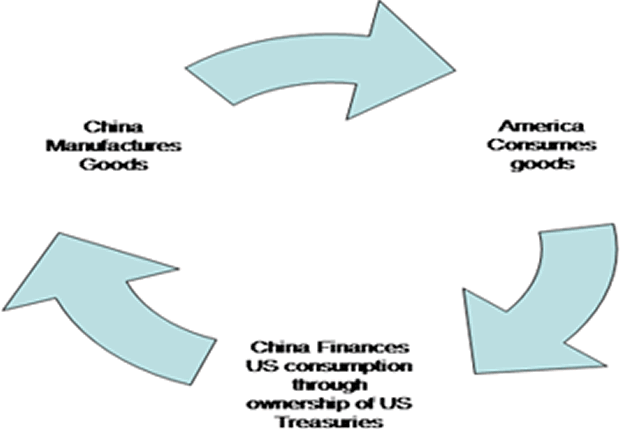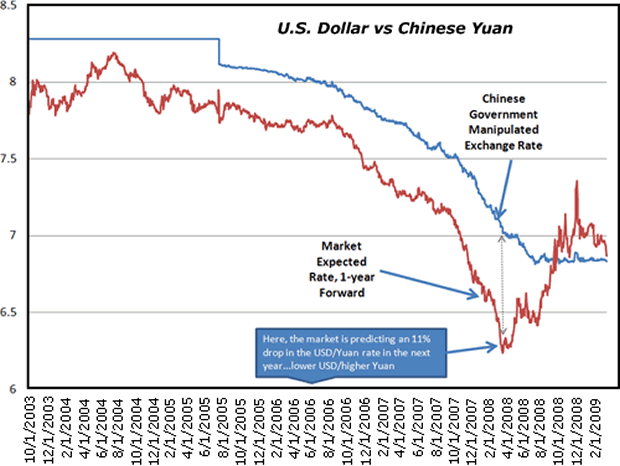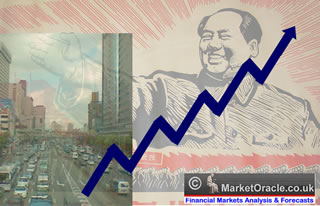How China Could Use Currency as a Weapon
Currencies / China Currency Yuan Mar 22, 2009 - 04:09 AM GMT Bryan Rich writes: China's currency policy is pretty far down the list of priorities for the U.S. Treasury staff. But it could be the turning point in this economic crisis — and for the worse.
Bryan Rich writes: China's currency policy is pretty far down the list of priorities for the U.S. Treasury staff. But it could be the turning point in this economic crisis — and for the worse.
Pressures on China to join the free market global economy on an equal playing field have intensified over the years. That's because during the last few decades, the artificially weak yuan had given China a distinct and unfair trade advantage, which helped propel its economy to become the third largest in the world.
While China became the world's factory, producing cheap goods for rich consuming nations, like the United States, competitive export markets were displaced by China's cheaper production. And the trade balance for net consuming countries plummeted deep into negative territory.
After consistent global political pressure led by the U.S. Treasury, the Chinese begrudgingly yielded in 2005 and began to slowly allow its currency to appreciate.
 |
| China's manipulated currency, the yuan, gives it a huge unfair advantage over its global trading partners. |
You see, when a country has a free floating currency, or one with a value determined by market forces, the value of the currency is measured on its merits. Countries with strong, robust fundamentals and a growing economy with stable inflation, tend to have strong currencies. And the opposite is true for weak, fundamentally flawed countries — those countries that cannot attract foreign direct investment, but also repel domestic investment.
In China's case, a fixed (or pegged) currency regime is a huge unfair advantage.
And here's why …
China doesn't have to play by the same rules as its counterparts that have free floating currencies. Economic transparency and adherence to globally accepted industrial policy standards and intellectual property rights are not part of the Chinese playbook. Therefore, countries that are willing to buy from China are at a competitive disadvantage.
A Cycle That Cannot Continue …
 |
When a country manipulates its currency to keep it weak, it creates a competitive advantage over its trading partners. The cycle shown below leads to a transfer of wealth from the consuming nation to the producing nation.
This cycle has dire consequences …
The United States is now dependent upon the Chinese to finance our consumption through ownership of U.S. Treasuries. And with an already fragile economy, the U.S. is put in a position of weakness relative to China.
Convenient Diplomacy …
When the global economy was roaring, China was the center for foreign direct investment. Endless talk of the insatiable demand from its emerging and abundant lower class drove commodities to record highs. And speculation of China becoming the largest, most powerful economy in the world was rampant.
To keep its key trading partners at bay, particularly the U.S., the Chinese gradually allowed their currency to climb. Three years later the yuan was up a meager 17 percent against the U.S. dollar. But that was enough to quiet the U.S. senators who had campaigned for a 27.5 percent tariff on all Chinese imports.
Meanwhile, the Chinese economy grew nearly 5 times faster than the U.S. economy!
Now, over the last year, China has virtually put the brakes on further appreciation. Its export-dependent economy has slowed dramatically and so has its compliance with revaluing the yuan.

Source: Bloomberg
Now, as you can see in the above chart, market participants (the red line) are pricing in a weaker yuan over the next year. An about face from the more than 11 percent revaluation the market was pricing in just 12 months ago.
Considering the breadth and depth of the economic crisis, I think China poses a valid threat to a global economic recovery.
Here's why …
Global Economic Market Share Is Ripe for the Taking
The credibility of U.S. global economic leadership is waning, and the major economic powers in the world are vulnerable. As a result, the U.S. political influence over China is vulnerable, too. So, if in fact, China's economy is improving as reported, this could be an opportune time for China to increase its share of the global market. And the perfect tool for the job: Currency devaluation.
While China's currency is virtually unchanged, its emerging Asian competitors, like South Korea and Thailand, have experienced currency declines in the 30 percent and 40 percent range. This doesn't sit well with Chinese officials.
 |
| A weaker yuan could boost China's economy and international trade. |
Weakening its currency will make China's goods even cheaper on the global market and could stimulate its economy. However, that move could have a dangerous impact on its fragile global trading partners, namely the United States.
As free market economies with free floating currencies are battling to revive growth and competitiveness, the Chinese could simply adjust down their currency. Most likely, this would be met with a very unfriendly response.
Devaluation of the yuan would be a direct rejection of American-led initiatives to level the global playing field. To this point the U.S. has handled China with kid gloves. It has been hesitant to officially name China a currency manipulator, which is a direct violation of World Trade Organization laws.
China's reversing course on its promise to global trading partners, most importantly the United States, would mean major political and economic warfare.
Threats of Protectionism …
Prior to China “revaluing” the yuan in 2005 and throughout the past few years, U.S. politicians have been waving the stick of protectionist threats. Those threats included a hefty charge at the port for Chinese goods — a 27.5 percent tariff.
This delicate relationship makes a deterioration of U.S./China relations a threat and potential catalyst for another leg down for the global depression. And it may already be starting …
The Pentagon has announced there have been a series of recent run-ins. One, for example, was when the Chinese harassed American naval ships in the South China Sea.
That's not all … don't forget China has the world's largest holding of U.S. Treasuries. And the Chinese have recently expressed discontent over the devaluing nature of the U.S. government's activities toward their investment.
I think the subject of China's currency is going to heat up. And I don't think China will hesitate to look out for its own best interest. That means devaluing the yuan to bolster its economy and go after a global economic market share.
What's more, it might start scaling out of the U.S. Treasury market. That would create some real fireworks, and is yet another reason to be cautious around longer-term government bonds right now.
Regards,
Bryan
This investment news is brought to you by Money and Markets . Money and Markets is a free daily investment newsletter from Martin D. Weiss and Weiss Research analysts offering the latest investing news and financial insights for the stock market, including tips and advice on investing in gold, energy and oil. Dr. Weiss is a leader in the fields of investing, interest rates, financial safety and economic forecasting. To view archives or subscribe, visit http://www.moneyandmarkets.com .
Money and Markets Archive |
© 2005-2022 http://www.MarketOracle.co.uk - The Market Oracle is a FREE Daily Financial Markets Analysis & Forecasting online publication.



